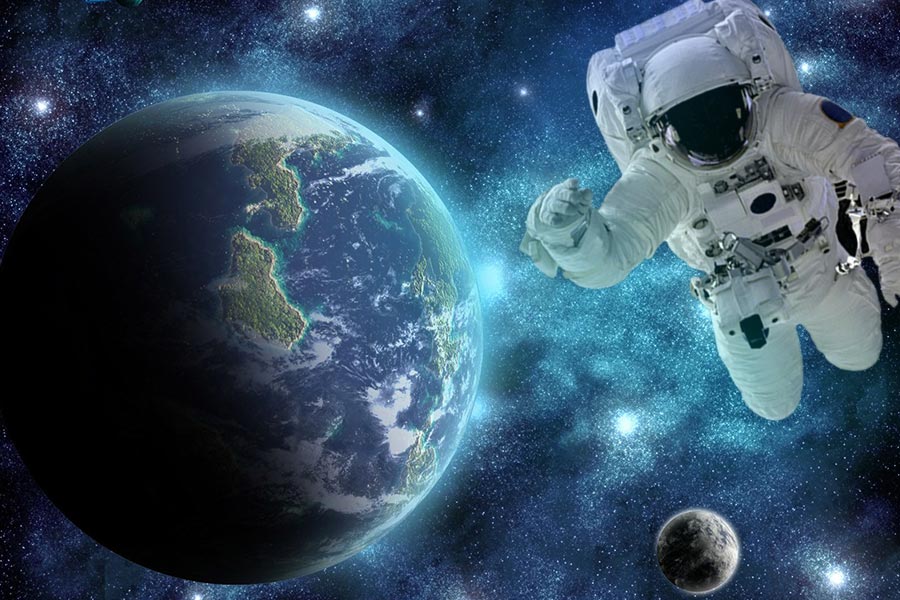The Pros & Cons of Space tourism in the UK: Is It More than Entertainment for the Rich?
8th Dec 2021
The idea of space tourism originated in the 1960s. The erstwhile President of Hilton presented his vision of a hotel on the moon for the first time. This was the Galaxy Lounge, where visitors could enjoy the view of the stars while sipping martinis in comfortable armchairs — entertainment for the wealthy elite. Of course, hotel lounges on the moon are still far away, but flying on a rocket to observe Earth from space is now possible not only for astronauts who have trained for years but also for civilians — although wealthy ones.
This year, aerospace companies Blue Origin and Virgin Galactic, owned by billionaires Richard Branson and Jeff Bezos, respectively, launched their first space tourist flights, proving that anyone can now go into space now. In terms of significance, the first space tourist flight event can be compared to the first civilian jet flight on the Boeing 747 in the late 60s, which made international air travel available.
Now that the first space tourist in the world has already been to orbit, Orbital Today analyzed the possible advantages and disadvantages of space tourism for the UK.
What does space tourism offer?

According to a report by the World Travel and Tourism Council, tourism accounts for nearly 10 percent of the world’s gross domestic product and about 300 million jobs (1 in 11). And the fastest-growing segment is travel, which is classified as “easy adventure.” Sending the first space tourist in the world to orbit perfectly fits the description. This trend guarantees success and promises a great future for suborbital space flights and space tourism companies.
The excitement caused by Virgin and Blue Origin space tourism launches confirms this statement. Even despite the 200-250-thousand-dollar cost of entertainment, hundreds of people have already bought tickets, and thousands more are ready to open up their pockets to become part of the first Virgin Galactic space tourism flights. Besides, one can choose different travel options. For example, Virgin Galactic offers a 2.5-hour ride on a Unity rocket plane with horizontal take-off, similar to a conventional aircraft, and Blue Origin space tourism flight implies an 11-minute trip on a New Shepard rocket with the vertical launch. In both Blue Origin space tourism flights and those of Virgin, the spacecraft rises to an altitude of 80-90 km, and the passenger experiences microgravity for only 3-5 minutes.
But Blue Origin and Virgin Galactic space tourism flights are just the beginning of commercial space travel. In the next ten years, the number of space tourism companies flights should be increased to 400-500 a year, which will predictably lead to a decrease in their cost and an increase in quality. Plus, civil orbital flights and commercial space travel could become commonplace. Roscosmos has already conducted a mission to deliver and return civilians to ISS in early 2021, and Space X sent four people on a 3-day journey around the Earth as part of the Inspiration 4 mission in September.
So, humanity gets access to a new kind of entertainment, which can become the ultimate dream for many. But is commercial space travel as attractive as it looks? Let’s consider space tourism pros and cons on the UK’s example.
Space tourism pros
- Space tourism will boost commercial activity at a time of poor global economy, become a new business area, and employ thousands of people. This looks promising for space tourism companies and the UK, which has recently been betting heavily on the space race.
- Investment will make the UK space tourism business more sustainable. Britain, as an island, relies heavily on air travel. If suborbital flights become a mode of transportation instead of pure entertainment, it will give new life to the transport industry, allowing to modernize declining airports. Besides, spaceflights will increase transportation comfort, reducing the time spent in flight tenfold. This, in turn, will boost efficiency for many businesses.
- New advanced technologies will emerge, paving the way for other areas besides space missions.
- Science will benefit from increased access to space and decreasing its cost. This will significantly accelerate the development of British society, increase its safety and comfort.
- New UK spaceports will expand their capabilities, as they will serve not only cargo launches but also passenger flights and social events like Virgin Galactic space tourism flights.
Space tourism cons
Now let’s move on to the potential disadvantages of UK space tourism.
- Rocket fuel burned during flight pollutes the atmosphere. CO2 emissions per space shuttle passenger are 50-60 times the emissions from a 10-hour Boeing 747 flight. At the same time, passenger spacecraft can carry significantly fewer people on board. While there are few flights, the degree of pollution is minimal, but the number of launches will increase. This can seriously affect the UK’s peculiar climate, raising a question as to the advantages and disadvantages of space tourism.
- Space travel is little researched, which could make the endeavor a dangerous one — another pressing issue to think over when analyzing space tourism pros and cons. Passengers may be exposed to solar radiation or other influences, and their side effects may develop over time.
- Heavy loads and zero-gravity conditions have a detrimental effect on human health. They provoke the development of gallstone and cardiovascular deceases. If astronauts are training for years, civilians will fly with minimal instruction.
- Lack of proper regulations and safety protocols can cause spacecraft wrecks, passenger deaths, pose a danger for people and animals on the ground, lead to destruction, fires, and pollution. In 2014, Virgin VSS Enterprise exploded during an experimental flight, leaving a trail of 35 miles. The pilot died, tipping the scales of space tourism pros and cons even more.
- The development of new space technologies, particularly UK space tourism, requires a lot of money, which could be spent on more pressing tasks, for example, the fight against poverty and hunger. Even if we consider all advantages and disadvantages of space tourism, we cannot discard the challenges we already face.
- The high ticket cost, which only the very rich can afford, will further accentuate the gap between the poor and the rich, potentially causing negative public attitudes towards this kind of entertainment. The first space tourist in the world has already been to orbit, but how many more can afford such a trip?
- Increased activity in orbits will lead to space traffic congestion, resulting in the danger of collisions with space debris. This can provoke Kessler’s syndrome, a chain reaction of explosions from spacecraft collisions. As a result, near-earth space will become completely unusable. Humanity will lose thousands of various-purpose satellites, in particular Earth Observation and Communication ones. Then, one will have to forget about satellite Internet, Moon and Mars exploration.
So, at first glance, the cons outnumber the pros, but perhaps you will find a few more benefits to tip the scales. In any case, it is already impossible to stop the space tourism machine. Right now, one can only hope that the first space tourist flights will be more than just a whim for the rich. But, most importantly, we can hope that space tourism will not cause more trouble than our planet already faces.






Thank you for your comment! It will be visible on the site after moderation.